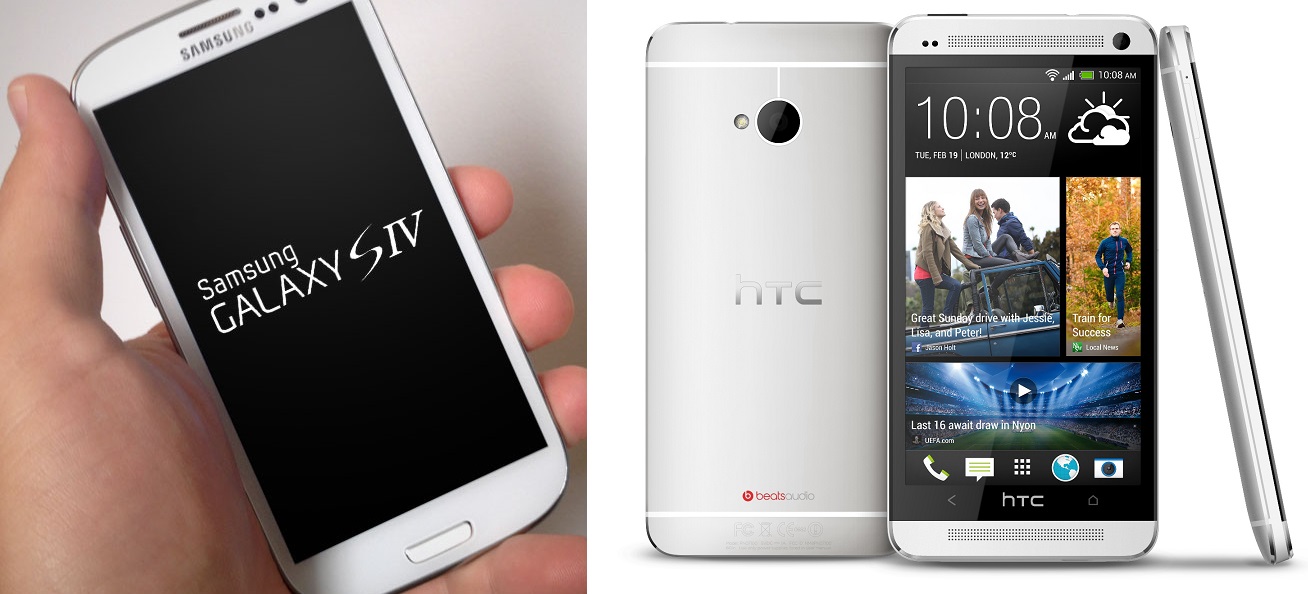Who won the first round?
Around one year ago, the quietly brilliant Taiwanese mobile manufacturer HTC got the jump start on its bigger rival Samsung when it launched the HTC One. It was an attractive handset with a gigantic screen and was almost universally well-liked by internet reviewers. While the chassis was slick, the phone’s biggest detraction was its skinned version of Android known as Sense 4. From a hardware perspective it was a powerhouse and looked set to crush the competition. It was months ahead of the looming Galaxy S3 and better looking to boot. It was going to be the smartest of the smartphones, and with its dashing looks it was set to conquer the Android market and restore HTC to power, glory and righteousness.
And then it flopped. It flat out belly panned in the market. People held on to their money and patiently awaited the arrival of the Galaxy S3. And when the S3 did arrive they bought it in droves, and droves, and droves. And then they bought it some more. Sales of the Galaxy outstripped the One by an embarrassing multiple.
Trouble is Knock, Knock, Knocking on HTC’s Door
Following the recent announcement of two next generation handsets, new HTC One X and the Samsung Galaxy S4, the present seems like an opportune moment to dissect HTC’s previous failure and ponder its immediate future. This could be a make or break moment for HTC. The company recently released its March revenue figures, which showed the lowest quarterly net profit since the company started selling products under its own brand in 2006. The Company has thrown its entire weight behind this new flagship product. If it all comes to naught you can guarantee that the vultures will begin circling the living dead corpse of HTC.
Meanwhile, Samsung recently hosted its S-Launch of the new Galaxy S4 with all the glitz and glamour (and sexism!) of a classic Broadway musical. In an hour long spectacle at the 6,000-seat Radio City Music Hall, Samsung extolled all the wonders of its latest genius device. Concealed under the stage was a full Broadway orchestra, and the event was streamed live to more than 500,00 eager fans and broadcast live in Times Square. Clearly Samsung’s legal skirmish with Apple has done nothing to dent the company’s confidence. Samsung is not a company that is quietly anything.
The conclusion drawn by Techcrunch writer Matt Burns is that in this day and age, making the perfect phone is just not enough.
Where Did HTC Go Wrong?
Founded in 1997, HTC has been a player in the mobile market for a long while. In 2011, the company overtook Nokia and seized the number three spot behind Apple and Samsung. But HTC was – and still is – a very distant third to those two. The sources of HTC’s woes are manifold. It has made a number of bad investments, including its partnership with Beats Audio and its acquisition of S3 graphics. But as many analysts have pointed out, its real failure has been in marketing and engineering a solid brand identity.
HTC produces premium phones with the highest build quality. But as sales demonstrate, that is no longer enough. There is no doubt that Apple shares HTC’s zeal for design and engineering, but it would seem that right now quality of manufacture just isn’t the biggest driver of consumption patterns in the mobile phone market. Consumers continue to flock to the galaxy of white plastic products spewing forth from Samsung HQ, often despite dubious build quality and their cheap plastic feel. It definitely seems that HTC is struggling right now because consumers are not currently validating one the lynchpins of HTC’s prior success – build quality. Apple on the other hand is surviving, albeit at a slower rate of growth. But unlike HTC, Apple has a huge base of fan boys and girls that continue to swell its sails. That is what happens when you have a lovable brand.
HTC’s decline is ultimately sad because in the past it was a trail blazer, it was one of the most innovative companies in the mobile space. The HTC Evo 4G was the first ever 4.3-inch Android phone, and in hindsight it fired the starting gun in the race for ever larger mobile screens. This race has now culminated in an entire new category of phones referred to “phablets”, phones which are so big they are almost a tablet. Indeed, most recently Samsung announced that the international version of the new Galaxy Note 8 tablet will be capable of making phone calls over the cellular network. Seriously, can you imagine holding a slab the size of a large paperback to your ear? As ludicrous as it sounds people just keep buying them.
Looking Forward
Will the new One be able to turn the tide for HTC? It seems doubtful. Sure it looks to be an incredible phone and has been almost universally well received by internet reviewers. The Verge, for example, has called it the best Android phone on the market. The aluminium chassis oozes quality, and the stereo speakers at the top and bottom of the device are truly novel. But can it stir the animal spirits of the mobile buying public and capture the public imagination? Some say that only time will tell. We say the crowd at uthinki will tell. Have your say and try to predict the crowd response.
 uthinki Considered Opinion?
uthinki Considered Opinion?



